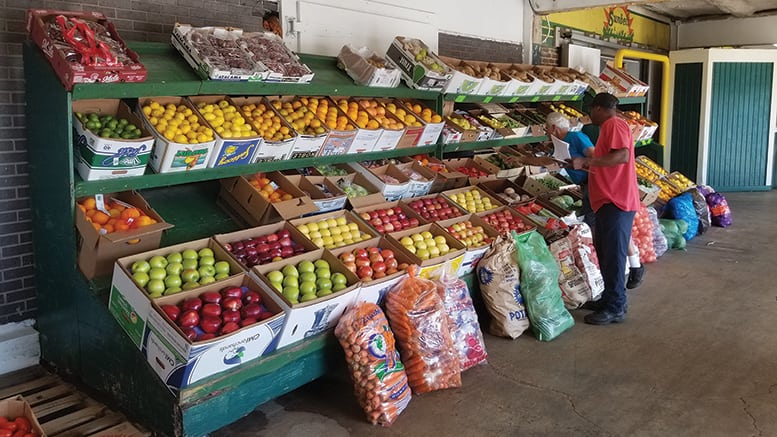Strong Atlanta Economy Favors Produce
August 1, 2018 | 9 min to read
In Atlanta, bustling business and strategic geography position it as the distribution hub of the Southeast. With a rapidly growing population and vibrant economy, the city attracts major companies and boasts extensive logistics networks, including highways and airports. Retail competition is intense, with new entrants reshaping the landscape while foodservice thrives, driven by local culinary innovation. The strong economy fosters demand for locally grown produce, enhancing Atlanta's culinary reputation as a premier dining destination.

Originally printed in the August 2018 issue of Produce Business.
Bustling business, logistics keeps this city the distribution hub for the southeast
In Atlanta, business is booming. An economic hub of the South, the metropolitan area remains critical for the distribution of goods and services, including produce, whose shipments are centered at the Atlanta State Farmers Market in Forest Park, GA.
“We think we are the hub of the Southeast,” says Andrew Scott, director of marketing and business development for the Atlanta-based Nickey Gregory Co. LLC, which distributes throughout the region. “Atlanta has become an international city.”
Scott points to Atlanta being considered for Amazon’s second headquarters (HQ2) and word that the city may host one of the World Cup soccer semifinals in 2026. “The city keeps growing out, which is why we have so many large companies with distribution centers here,” he observes. “We have so many Fortune 500 companies set up shop here.”
Although many distributors at the Atlanta State Farmers Market keep busy servicing retail, foodservice and wholesale customers in the immediate Atlanta metro area, several market wholesalers regularly deliver overnight to customers in 11 to 14 nearby states. “The Atlanta Market serves as the terminal market of the Southeast,” says Paul Thompson, State Farmers Market manager. “Atlanta has found a niche in wholesale food distribution,” he says.
The A-Town’s metro area’s proximity to, and connections with, surrounding states help with connectivity. Highways I-75, I-85, I-20, I-16, as well as connecting routes I-575 and I-985 and other major highways, intersect in Atlanta.
LOGISTICAL ADVANTAGES
“Atlanta is an ever-changing market; it sets the tone for the South, so to speak, and possibly the nation,” notes Gene Sutherland Jr., president of Atlanta’s Sutherland’s Foodservice, Inc. “Some of the most well-known chefs have restaurants in Atlanta. It has evolved from the basics in produce to now focusing more on organic or locally grown product.”
The ‘A’, as it’s also nicknamed, ranks highly in national produce distribution as well. “Though we have competition in Birmingham, Tallahassee, Jacksonville, Greenville, Charlotte and Nashville, regardless, Atlanta is still the major distribution hub of the Southeast,” says Eric Hoffmann, vice president of sales of the Atlanta division of Springfield, IL-based Tom Lange Co., Inc.
With a population of 5.8 million, the Atlanta-Sandy Springs-Roswell metropolitan statistical area is the nation’s ninth largest. Though it trails Dallas, Houston and Miami among cities in the South, the 89,000 people who moved to the Atlanta metro area in 2017, however, make it the third-fastest growing metro region, according to the U.S. Census Bureau. Only Dallas and Houston experienced higher growth.
The surrounding states of Alabama, Tennessee, North Carolina and South Carolina are close to the metropolitan area. “Atlanta is a pivotal place in the Southeast,” says David Collins III, president of Forest Park-based Phoenix Wholesale Foodservice, Inc. “In two hours’ time, you can be to a lot of places. You don’t have the world’s largest airport in a city for no reason. It’s a convenient spot.”
That geographic proximity gives those that wholesale and broker produce throughout the Southeast an advantage. “This area has a good network of roads and transportation,” says Hubert Nall III, president of the Atlanta-based Hubert H. Nall Co., Inc., brokerage. “There’s a lot of people here. Atlanta’s reputation has been strong for a long time.”

BUSINESS GROWTH
Along with increasing population, Atlanta is also experiencing strong business growth.
For five consecutive years, Georgia has been ranked as the No. 1 place in the United States to do business, according to Site Solution magazine.
“The city of Atlanta is not only a growing and vibrant city, but has a very dynamic economy as well,” says Matt Jardina, vice president of general business operations for Atlanta’s J.J. Jardina Co., Inc. “There is a great deal of growth both in terms of its population as well as its infrastructure. Additionally, there are more and more cool places to live within the city that are attractive to the growing Millennial population.”
The region’s growth is helping business. “Business is moving well,” says Bryan Thornton, general manager of Coosemans Atlanta, Inc. Thornton notes how industries, including the movie industry, have expanded in the area. That industry is adding many jobs as one can see film productions occurring in many areas of the metro. “The movie industry has been a huge driving force,” he says. “The city’s (business) growth is bringing a lot more people here.”
The metro area is changing for the better. “Atlanta is increasingly becoming an eclectic city,” says Robert Poole, senior sales coordinator for Athena Farms in Forest Park. Poole points to an Atlanta Braves baseball series when the New York Mets played in Atlanta. A typical game against New York will find 40 percent of the fans attending are transplants who live in Atlanta. Those fans, he says, moved to the area for a reason. “Though part of their allegiance is to New York, where they’re choosing to live isn’t New York,” says Poole. “From a demographic standpoint, Atlanta and the South is growing in ways that the North isn’t. That helps our food scene.”
The city’s geographic location and other amenities make it a great place to live, work and do business. “There’s a lot to do here,” says Cliff Sherman, owner of Forest Park-based Sunbelt Produce Distributors, Inc. “Atlanta is in the heart of the South, where you can go north to the mountains or southeast to the beach. Atlanta is in one great location.”
STRONG ECONOMY
Given the city’s construction of two stadiums in recent years, it’s difficult to deny the metro area’s strong economy, says the State Farmers Market’s Thompson. “Building and construction are strong,” he says. “There’s a lot of business. Atlanta is a great place to be and is such a great place to live. As long as Atlanta grows, we will keep growing along with it.”
Some hindrances, however, include retaining qualified labor in critical industries, including trucking, hotels and foodservice establishments, notes King Yan, general manager of Sanwa Produce Atlanta. The city’s growth has produced traffic jams, which require long waits on the roadways. Despite the problems, Yan says, “the economy is strong and has really changed over the past few years.”
Atlanta remains an attractive area that is favorable for business growth, observes Collins. The metro area hosts many company headquarters, including The Home Depot, Coca-Cola and Delta Airlines. “We are feeling the wind at our backs,” he says. “Every time you turn around, you see growth everywhere.”
One part of the metro area that’s helping attract new business, for retail and foodservice, is redevelopment in areas such as Ponce City Market, in the northeast part of downtown on Ponce de Leon Ave. The renovated Sears, Roebuck and Co. building is an upscale destination with lofts, restaurants and shopping. New to Atlanta, the BeltLine, an old railroad track transformed into a walking trail, is attracting new restaurants and housing.
“These are bringing people back to the city,” says Poole. “The BeltLine has really exploded in the past few years. Places like Ponce City Market are very good for the health of the city. They’re attracting money, the upper-middle class is moving into those areas.”
DISTRIBUTION CENTER
Atlanta’s location gives it geographic advantages. During different times of the year, it’s easier for customers to load product from the market than to travel south into Florida or north to the Carolinas and Virginia. “The Atlanta market attracts people from all over the Southeast,” says Sherman.
Much offshore produce is airfreighted to Atlanta, says Tom Lange’s Hoffmann. As port cities of Savannah, GA, Charleston, SC, and Mobile, AL, are in close proximity, Atlanta receives many containers of produce from Central America and South America. “Because of its location, and the ability to bring product directly without having to make intermediate stops, the produce gets here a bit fresher,” he says. “We get a lot of exotics from all over the world flown into the airport.”
The Atlanta State Farmers Market also is becoming a hub for sweet corn. In early June, Caruso, Inc., a Cincinnati-based 3PL logistics provider, opened a sweet corn processing facility on the market. The $2 million operation can process 1 million ears of corn per week and package up to 90 tray packs per minute. “We can produce a lot of corn out of here,” says Jim Caruso, Jr., president and chief executive.
The facility will help expand marketing opportunities throughout the Midwest, he says. Caruso plans to process Georgia corn first, and later expand to other Georgia produce. “This will be a good way to facilitate small farmers throughout Georgia to get them to retail markets,” he says.
Most of the national supermarkets and many of the South’s and Mid-Atlantic’s leading chains, including Kroger, Publix and Walmart, maintain a presence in the highly competitive Atlanta market. Other national players, including Sprouts, and regional operators, are entering or expanding in the market. Lidl is constructing a distribution center in Cartersville, GA, about an hour north of Atlanta, and other new players are building distribution facilities.
RETAIL, CULINARY BOOM
In the past, A&P, Cub Foods and Winn-Dixie were the big players. Publix has since shaken things up and other entrants including Aldi, Lidl and Trader Joe’s, are dominating the retail landscape, says Coosemans’ Thornton. “This is a very competitive market,” he says. “We have many more players. The space in the Atlanta market for retailers has changed because we have different players in the mix. Everyone is finding their own niche in the fresh produce distribution network.”
Movement is a strong as ever in retail, says Sutherland’s’ Sutherland. “These retailers are looking to expand their local footprint in Atlanta,” he says. “The new retailers are helping to bring new ideas and concepts to Atlanta. While the large players will always remain strong in the market with their footprints, some of the smaller, specialized retailers continue to gain traction. From Food Depot and Fresh Market to the new kids on the block Lidl, they all bring something a little different that today’s consumers are looking for,” says Sutherland.
Sales to the foodservice sector remain strong. “Foodservice sales are always robust, especially with a growing economy,” says J.J. Jardina’s Jardina. “The booming economy is making ‘all boats rise’ in our industry, as consumer confidence is at all-time highs in terms of the economy. You may not hear about it on the news, but it is really booming in terms of consumer spend for fresh produce and fresh-cut produce.”
In the past, Atlanta’s foodservice distribution business was dominated by smaller purveyors. Today, large and smaller distributors are expanding in the region, says Thornton. “You see more larger companies coming in,” he says. “We have seen a lot more smaller distributors. We are seeing a resurgence of smaller food companies. The savvy small foodservice purveyors are becoming more compliant with the foodservice distribution rules.”
The city’s culinary reputation is helping the restaurant business, notes Hoffmann. “There is a very wide variety of culinary choices in Atlanta,” he says. “The local chefs have done a terrific job of bringing new items to the table. It’s fun to go out and have dinner in Atlanta.”
SIZZLING CULINARY REP
That reputation is deserved. “Our food scene is second to none,” says the Market’s Thompson. “It is outstanding — the options and variety of restaurants in this city.”
Local chefs dominate Atlanta’s culinary scene, says Athena’s Poole. “These chefs are on the cutting edge of being unique and run really nice restaurants,” says Poole. “From a national standpoint, Atlanta ranks in the top on some lists and in the top five as far as variety, availability and general quality of product. There are a lot of opportunities for someone seeking a good meal in Atlanta.”
The major foodservice players consider Atlanta important. “Foodservice is really growing here,” says Nickey Gregory’s Scott. “People are eating out more. Atlanta has a good restaurant scene.”
A revival of group travel is helping hotels that host conference facilities. The segment has rebounded and is helping the conference center hotel concepts, says Phoenix’s Collins. For restaurants, the business isn’t always successful, he says. “Some of the concepts have seen some fall-off in some cases, where they haven’t kept everything fresh, current and relevant,” he notes. “Some of the restaurant groups are seeing where same store sales are not going up. Some of that is attributed to the labor, the management and the execution, while others may be attributed to declining appetites for those particular concepts.”
Locally grown is a big push among chefs and restaurateurs in the growing foodservice trade. The Georgia Department of Agriculture’s Georgia Grown program has done well promoting the state’s produce abundance, says Sutherland. “Produce sales continue to be strong in the foodservice segment,” he says. “With all the new restaurants here and caterers popping up in town, there is plenty of business for all of us to go around.”
Local produce garners high consumer attention, says Jardina. “The locally grown options are important, as there is a great deal of demand for locally grown produce and foods in general,” he says. “In my opinion, it is a great deal more interesting to consumers than organic produce, and it’s a great deal cheaper.”
21 of 23 article in Produce Business August 2018





